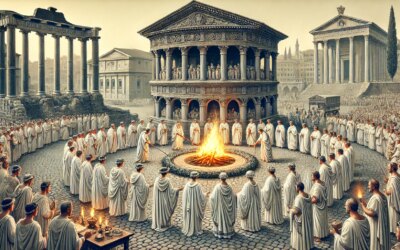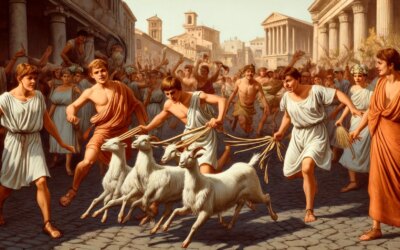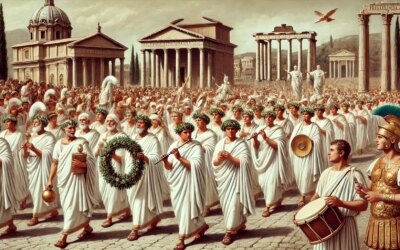Introduction: A Pagan Emperor in a Christian Empire
In 361 AD, a new emperor ascended to the Roman throne—Julian, a scholar, philosopher, and devout adherent of the old Roman gods. Known to history as “Julian the Apostate,” his reign marked one of the final and most extraordinary attempts to revive traditional Roman religion in an empire increasingly dominated by Christianity. Though brief, his rule was a passionate and intellectual campaign to restore a fading spiritual order.
Julian’s Early Life and Education
Flavius Claudius Julianus was born in 331 AD into the Constantinian dynasty. After the murder of many of his relatives during imperial purges, he was raised in relative isolation, educated by Greek philosophers and steeped in classical literature. Though baptized a Christian, Julian secretly adopted Neoplatonic paganism in his youth, captivated by the works of Plato and the traditions of Greco-Roman worship.
Military and Political Rise
Julian proved himself a competent military leader, particularly during campaigns in Gaul. In 360 AD, his troops proclaimed him Augustus in defiance of his cousin Constantius II. Upon Constantius’ death in 361, Julian became the sole ruler of the Roman Empire. He immediately set about reversing decades of Christian dominance, not through violent repression, but with a program of cultural and religious restoration.
The Pagan Revival
Julian envisioned a rebirth of Roman polytheism, infused with philosophical depth and moral rigor. He reestablished temples, reinstituted traditional sacrifices, and reorganized the priesthoods along hierarchical lines similar to the Christian Church. Julian’s paganism was not mere nostalgia—it was a theological system rooted in Neoplatonism, aiming to offer ethical and spiritual guidance equal to or surpassing Christianity.
Policy and Propaganda
Julian issued edicts promoting religious tolerance while favoring pagan institutions. He sought to weaken Christianity indirectly: banning Christians from teaching classical texts, removing imperial patronage, and supporting alternative schools and charities. He wrote satirical and polemical texts against Christian theology, portraying it as irrational and derivative. His approach, though ideologically driven, avoided the bloody persecutions of earlier emperors.
Challenges and Resistance
Julian’s policies met mixed reactions. Pagan elites welcomed the restoration of old cults, but the Christian majority remained loyal to their bishops and communities. His efforts to unify diverse pagan traditions under a coherent system proved difficult. Local cults, mystery religions, and philosophical schools lacked the institutional unity that gave Christianity its resilience.
The Persian Campaign and Sudden Death
In 363 AD, Julian launched a bold invasion of the Sassanian Persian Empire, hoping to secure his eastern borders and emulate Alexander the Great. Though initially successful, the campaign turned disastrous. Julian was mortally wounded during a skirmish near Samarra. With his death at age 31, the pagan revival collapsed. His successors, all Christian, quickly reversed his reforms.
Legacy of Julian the Apostate
Julian remains one of the most intriguing figures of late antiquity. To pagan philosophers, he was a hero and martyr for the old gods. To Christians, he was a cautionary tale of hubris. Modern scholars admire his intellect, moral rigor, and unique vision, even as they acknowledge the impracticality of his aims. His writings, especially *Against the Galileans*, and personal reflections offer rare insight into a mind straddling two religious worlds.
Conclusion: The Last Light of the Old Gods
Julian’s reign, though brief, illuminated the twilight of Roman paganism. His dream of a restored, philosophically rich polytheism could not overcome the momentum of Christian expansion. Yet his life and works endure as a testament to the complexity of belief in the Roman world, and the enduring tension between tradition and transformation. In Julian, we see not just a ruler, but a thinker who dared to reshape the spiritual destiny of an empire.






